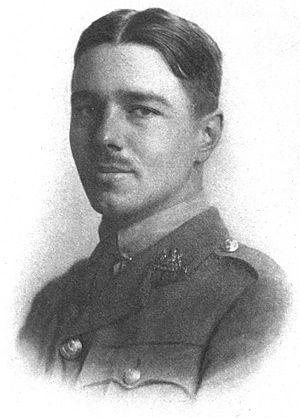List of poems by Wilfred Owen facts for kids
Wilfred Owen was a very important English poet. He is famous for writing powerful poems about World War I. His poems show the real, harsh experiences of soldiers during the war. This article lists some of his most well-known poems and explains why they are so special.
Contents
Wilfred Owen: A Poet of War
Wilfred Edward Salter Owen was born in 1893 in Oswestry, Shropshire, England. He grew up loving poetry and started writing at a young age. When World War I began in 1914, Owen joined the British army. He became an officer and fought on the front lines.
His experiences in the trenches deeply affected him. He saw the terrible conditions, the suffering, and the loss of life. These sights inspired him to write poems that showed the truth about war. Unlike many poets who wrote about the glory of war, Owen focused on its horrors. He wanted people back home to understand what soldiers were truly going through. Sadly, Wilfred Owen was killed in action just one week before the war ended in 1918. He was only 25 years old.
Why His Poems Matter
Wilfred Owen's poems are still studied today because they are so honest and moving. He used vivid language to describe the sounds, sights, and feelings of war. His work helped change how people thought about war. He showed that it was not always heroic, but often tragic and wasteful.
His poems often use strong images and sounds to make readers feel like they are there. He wrote about the fear, the pain, and the sadness of soldiers. He also wrote about the friendships and bravery he saw.
Famous Poems by Wilfred Owen
Owen wrote many poems, but some are especially famous. These poems are often taught in schools around the world. They help us remember the sacrifices made during World War I. They also teach us about the importance of peace.
"Dulce et Decorum Est"
This is one of Owen's most famous poems. Its title comes from a Latin saying that means "It is sweet and proper to die for one's country." Owen uses the poem to show that this saying is a lie. He describes a gas attack and the terrible death of a soldier. The poem makes you feel the horror of war very strongly.
"Anthem for Doomed Youth"
This poem compares the deaths of soldiers to a funeral service. Owen uses sounds like the "rattle of rifles" instead of church bells. He shows how soldiers die without proper goodbyes. The poem is a sad tribute to the young men who lost their lives.
"Futility"
"Futility" is a shorter poem that questions the meaning of life and death in war. It describes soldiers trying to wake a dead comrade by moving him into the sun. The poem wonders why life is created if it can be so easily destroyed in war.
"Strange Meeting"
In this poem, Owen imagines a meeting in the afterlife between two soldiers. One is British, and the other is German. They talk about the pity of war and the dreams they had for their lives. This poem shows Owen's belief that all soldiers, no matter which side they fought on, shared similar experiences and hopes.
Other Important Poems
Many of Owen's other poems also explore the themes of war, suffering, and humanity. Here is a list of some of them:
- "1914"
- "A New Heaven"
- "A Terre"
- "Arms and the Boy"
- "As Bronze may be much Beautified"
- "Asleep"
- "At a Calvary near the Ancre"
- "Beauty"
- "But I was Looking at the Permanent Stars"
- "Conscious"
- "Cramped in that Funny Hole"
- "Disabled"
- "Elegy in April and September"
- "Exposure"
- "Greater Love"
- "Happiness"
- "Has Your Soul Sipped?"
- "Hospital Barge"
- "I Saw His Round Mouth's Crimson"
- "Insensibility"
- "Inspection"
- "Le Christianisme"
- "Mental Cases"
- "Miners"
- "Music"
- "S. I. W."
- "Schoolmistress"
- "Six O'Clock in Princes Street"
- "Smile, Smile, Smile"
- Soldier's Dream
- "Sonnet On Seeing a Piece of our Heavy Artillery Brought into Action"
- "Spells and Incantations"
- "Spring Offensive"
- "The Calls"
- "The Chances"
- "The Dead-Beat"
- "The End"
- "The Kind Ghosts"
- "The Last Laugh"
- "The Letter"
- "The Next War"
- "The Parable of the Old Man and the Young"
- "The Roads Also"
- "The Send-off"
- "The Sentry"
- "The Show"
- "The Wrestlers"
- "Training"
- "Uriconium An Ode"
- "Wild With All Regrets"
- "With an Identity Disc"
- "How to Smile"
Wilfred Owen's poems continue to teach us about the human cost of war. They remind us to value peace and to understand the experiences of those who serve.
 | Aaron Henry |
 | T. R. M. Howard |
 | Jesse Jackson |


